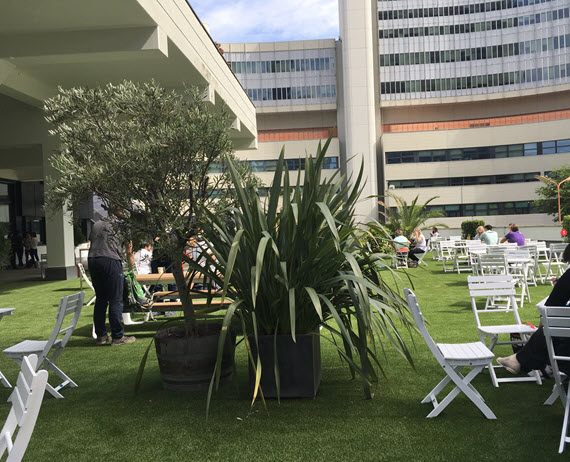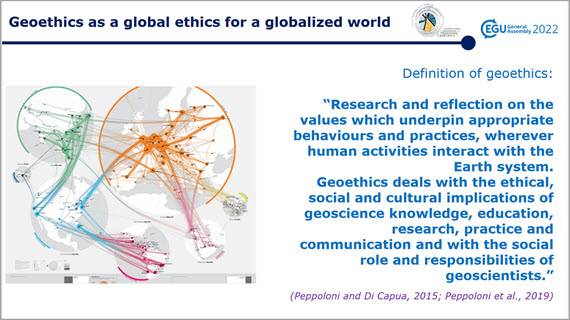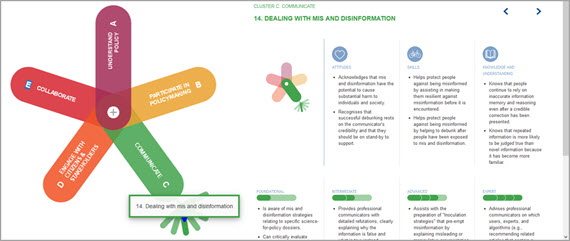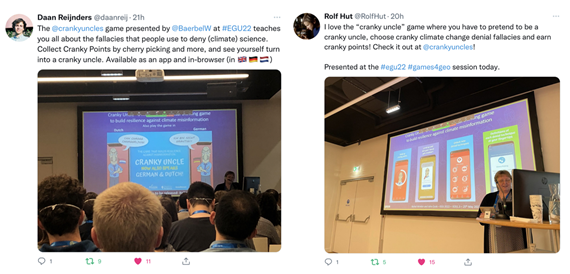EGU2022 - A personal diary from a science enthusiast perspective
Posted on 27 May 2022 by BaerbelW
After two years of Corona-induced online meetings in 2020 and 2021, this year's General Assembly of the European Geosciences Union (EGU) started on Monday May 23 both on premise in Vienna and online as a hybrid conference. I spent the whole week in Vienna, picking and chosing sessions I was interested in. This blog post will be a compilation - a kind of diary - of the happenings from my perspective.
As this post is fairly large, you can jump to the different days, via these links:
Monday - Tuesday - Wednesday - Thursday - Friday
Each day was structured into 1.5-hour session timeslots which consisted of 15 to 20 short orals where each presenting author had at most 3 to 5 minutes to share her or his abstract in a kind of elevator pitch with time for 1 or 2 questions at the end before it was the next author's turn. This obviously only allowed for very short and time blocked presentations with at most a handful of slides. Longer presentations could however be uploaded to go with the abstract where offline discussions were possible and encouraged as well.
Monday, May 23
Having already picked up my badge on Sunday afternoon, I could skip the expectedly long registration line and directly proceed to the first session I had put onto my agenda which started at 8:30: EOS1.1, Science and Society: Science Communication Practice, Research, and Reflection. Because of the many submitted abstracts, EOS1.1 had been given two 90 minute timeslots and they were really worthwhile listening to. We heard about a Climate Action Hackathon, Immersive storytelling, Illustrating Climate Science, KlimaatHelpdesk.org which is a Dutch website providing short answers to climate-related questions (example via Twitter), Imagine it's climate crisis - and nobody gives a sh**! to name just a few. All the abstracts are publicly available already and many longer displays will become open access after June 30.
After the lunch break, I went to the short course SC3.6/EOS2.4 which asked the somewhat rhetorical question „Scared of giving presentations?“. Because the room was already way too crowded and spilling over into the hallway when I got there, I found a table on an outside terrace and joined the session online via Zoom. This worked pretty well and is - in my opinion - another advantage of organizing a hybrid conference as all the sessions are streamed online anyway making access easy as long as you have a stable internet connection. Sitting outside in balmy spring weather without the need to wear a mask was a definite bonus! The presenters shared lots of helpful tips and tricks of how to avoid - or at least subdue - stage fright.

As joining the session via Zoom had worked well I did the same thing for the short course SC2.6 about growing your scientific network. The session was aimed at early career scientists (ECS) and was quite popular with people sitting on the floor in the room and standing in the doorway. So, sitting just outside the room‘s window on the terrace at a table was a lot more comfortable for various reasons! While many of the suggestions were geared towards scientists, some also apply to science communicators, like for example these:
- Use social media: twitter is (usually) a friendly place for scientists
- Connect with people on Twitter / LinkedIn by commenting posts
- Exchange contact details, business cards, twitter handles
- Follow up on a first meeting
- Contact authors after reading their interesting paper
- Make yourself visible on the internet
To wrap up day 1 of EGU22 I joined session SC3.8 Rhyme your research which had been a fun experience the other times I had already participated in this annual offering. Tim van Emmerik led this year‘s session because Sam Illingworth couldn‘t make it to Vienna this year. We did a couple of short exercises, jotting down terms related to geoscience, tried to find a term for each letter of the alphabet, had to provide the second part of a sentence he gave us the first part of, then cut up the paper and mix the two parts of the sentences so that something else - often no longer coherent - was created. We then compared our results to that of the person sitting next to us trying to identify which scrambled sentences might make for good parts of a first and second line of a „poem“. Finally, we merged our musings with those of two other participants and quite some interesting combinations were created as this tweeted example shows! As in previous years, this was a fun way to end a conference day! If you'd like to know more about this particular session, please check the EGU blog post "Discover your inner research poet!" published on June 2.
Tuesday, May 24
The focus of the 2nd day at EGU22 for me was on Geoethics, a topic I had heard about before but couldn‘t really properly place. Given that I was a co-convener on a townhall meeting related to both climate literacy and geoethics later on the day, I spent the afternoon in session EOS4.1 in order to brush up my understanding. The session titled „Geoethics in the face of global anthropogenic changes: how do we intersect different knowledge domains?“ had received almost 20 submitted abstracts and was therefore given two timeslots with a coffee break in between.
In case you - like me - don‘t know what Geoethics are all about, here is a definition shown during the session:
As I learned during the session, there are quite a lot of facets to Geoethics. Here are just a few which stood out for me (there is more information on the IAPG-website):
- Is it ethical to build a dam if it destroys habitats and potentially disrupts water flow downstream but also reduces uncontrolled flooding and provides electricity for people?
- Is it okay to dig up „stuff“ if this at the same time destroys the geological memory?
- Many studies cannot be reproduced because their object of study may have been a big volcanic eruption, the devastation caused by a hurricane or a tsunami. Neither of which could - or should! - be recreated just to make the study "reproducable".
- Many of the current issues like human-caused climate change are occuring because Geology provides the information of where and how to dig up coal or drill for oil and gas. Do geologists therefore have a responsibility to fix the issues caused by their research?
- There are often ethical challenges with gathering data and also making the collected data as accessible as possible.
- Is it ethical for educators to teach geology students about extracting fossil fuels even though we know about the impacts burning these resources will cause?
After a short break it was time for EOS1.8 Climate & ocean literacy: Helping people to care ethically within planetary boundaries with presentations about various projects related to educational opportunities. Here are some highlights:
- Evaluation of OCE’s lesson plan for 9-12 year old students on emotions related to climate change trying to answer the question of wheter „To worry or not to worry“
- Resources for teachers on “Climate Change and Land” and research on eco-anxiety introducing the website Office for Climate Education (OCE) which provides teaching resources about climate change for (mostly) primary school teachers in French, Spanish and English.
- Secondary School Teacher’s Awareness of Climate Change in Spain, revealing quite some misunderstanding regarding the causes of current climate change.
- Climate and Oceans Planetary Boundaries: for Climate Literacy
- Raising awareness of the impact of climate change on coastal regions. A citizen science-based approach within the SECOSTA project
- Schools By The Sea Program which is an expample for participatory learning for students in Brazil
- Developing a National Climate Education Action Plan in the UK
- Climate literacy for professionals in the Netherlands
- Participatory simulation: Climate and ocean literacy in action organized online with participants from around the globe and many age groups
Day 2 wrapped up with Townhall Meeting TM8 to explore the nexus between geoethics and climate change education for which I found myself sitting on the panel next to Sylvia Knight from the Royal Meteorological Society in the United Kingdom of Great Britain, Eduardo Marone from FUNPAR, CEM-UFPR in Brazil, Sabine Undorf from Potsdam Institute for Climate Impact Research in Germany and as a special guest Svitlana Krakovska, Senior Scientist, Ukrainian Hydrometeorological Institute and IPCC author. Svitlana had made the news after her „fossil fuel war“ comments made at the online gathering to approve the summary of the latest IPCC 6 report to be released on February 28 just a few days after Russia's invasion of Ukraine. Cleantechnica has an article about Svitlana as does the Guardian.
Wednesday May 25
The morning started early for me with joining short course SC2.3 The role of scientific institutions in policymaking as I thought it might provide some helpful pointers for my involvement with Citizens Climate Lobby in Germany. It however turned out that some of the outlined competencies also overlap quite a lot with what we do at Skeptical Science, namely competency #14 within the Communicating Cluster C: Dealing with mis- and disinformation. Each competency has four levels of proficiency from foundational via intermediate and advanced to expert. This is an official EU Commission project which can already be found online here but is not yet complete. It‘s freely available for anybody from anywhere and should come in handy for many organizations dealing with policy.
From the Competence Framework - to use the interactive graphic, visit the website and move the cursor over the main competencies to see the details.
The next session was another short course for me: SC3.3 Writing the IPCC AR6 report: behind the scenes. It started off with a quick round of true & false questions and a quick rundown of what the IPCC is. After a short presentation, it was time for a question and answer session with IPCC AR6 authors. Being an IPCC-author is voluntary work and can be quite demanding as far as time committment is concerned. This was especially true for the Working Group 1 report about the physical science where a lot of the reviewing had to be done virtually due to COVID-19 making physical meetings impossible. Online meetings therefore tended to happen at all times of the day, even in the middle of the night depending on where authors were located.
My afternoon started with a very creative session: EOS1.2 Exploring the Art-Science Interface. The short presentations covered everything from poetry, to music, to graphics and much more:
- Glacier Gifts: adventures in creative writing in the Peruvian Andes
- Introducing s-Ink.org – a community portal for sharing quality science graphics
- Kilns of the Earth: Glass art collaborations to further understanding in volcanology
- SEA – Science Education and Art – lessons learned from an interdisciplinary conference
- Exploring Comet 67P through art and science
- The art-science interface: making York's air pollution visible
- The Cryosity project – Artistical preservation of snow crystals and glacier ice samples from Antarctica and the Arctic
- The Music of Water
- Collective Art Practice for Communications-Directed Climate Visualization
- Environmental resilience in rural Wales (UK): the role of art in scientist-artist-farmer engagement
- Assimilated Watercolours: Pop up art exhibitions in Care Homes
- Reflecting on how science-design processes at the interface between ecology-geomorphology-art-design-manufacturing-engineering can lead to important innovations and models of practice.
- Reflecting on how science-design processes at the interface between ecology-geomorphology-art-design-manufacturing-engineering can lead to important innovations and models of practice.
- Brantas XOXO: Community river art for river community action
- Collective Art Practice for Communications-Directed Climate Visualization
Afterwards it was playtime with session EOS1.3 Games for Geosciences chaired by Rolf Hut in which I briefly introduced the participants in the packed conference room to our Cranky Uncle game. Judging from the reactions, it was the first time many of them heard about Cranky Uncle and it was reassuring that the audience laughed every once in a while during my 3 minute pitch. Some apparently downloaded the game right away and others intend to so later. The detailed presentation about the Cranky Uncle game can be opened and downloaded in PDF format (2.1MB) here. A PDF-version of the short "pitch" presentation is available here.
Tweet on the left from Daan Reijnders and the one on the right from Rolf Hut.
Other presentations in the session explained how Minecraft could be utilized, how geological mapping could be taught with virtual reality (presented by the author‘s avatar!), QUARTETnary - The card game about the geological time scale (with beautifully designed cards!), role-play gaming to teach „environmental impact assessment,ClimarisQ: a Smartphone game to highlight the complexity of the Climate Systems and the impacts of Extreme Events (currentlyavailable for Android and browser), Gaming towards a sustainable future, The Trilogy of Ocean, Climate and Coast: The Urgency and Exigency of Literacy
Thursday May 26
My day started with short course SC3.5 about Scientific visualisation: Visualise your data effectively and avoid common pitfalls which provided some helpful tips of how to create good graphics and what to avoid like e.g. the popular rainbow color scheme. The short course was presented by members of the Young Hydrologists Society (YHS) and they made their presentation available on their website. They especially highlighted Fabio Crameri‘s work who provides suggestions for color schemes which will also work for people affected by color blindness.
As I didn‘t have any other sessions selected to go to, I relocated to terrace G to sit outside in the fresh air again. Around noon I met with Jan Chylík who had kindly filled out our Google form to help with translations of the Cranky Uncle game, in his case into Czech. Whenever people fill out the form I usually sent them an email with the relevant information about this somewhat special translation activity. So, it was nice to actually meet in person and share „some“ information face to face. Jan‘s offer is the first for a translation into Czech and it‘s usually good to work as a team of 3 to 5 people. So, if you read this and per chance are interested to get involved, please fill out the form as Jan did and I‘ll be in touch soon.
Friday May 27
The last day of EGU22 started with a great debate: GDB2 - Climate change is a code red for humanity: What does this mean for the earth science community? The panel was chaired by Nick Everand and Chloe Hill and had Daniel Parsons (University of Hull, UK), Peter Gluckman, (International Science Council, New Zealand), Simon Clark (UK) and Jenny Turton (Arctic Frontiers, Norway) on the panel. The lively debate was far-ranging, covering statements like „scientists should infiltrate everything“, that they need to help fight misinformation, how scientists could and should get involved online and a lot more. The debate was recorded, so there should be a video on Youtube sometime down the line and I‘ll swap the still image to the video if/once it becomes available. It'll be 90 minutes very worthwhile watching!
After this interesting debate, I headed down to terrace G yet again, this time to meet with Marine Poizat who - just like Jan mentioned above - had filled out the Google form after hearing my short talk about the Cranky Uncle game. Marine was interested to help with the French translation, one of the languages already in the works and fairly far progressed. After explaining some details about the game and our translation setup, I offered to check with the team currently working on the task to see where they still might need help and where a "fresh set of eyes" might come in handy. Given that in addition to the game itself we also have some supporting material like the Teachers' Guide, I'm fairly certain that there'll be some options for Marine to get involved!
A subsequent trip to the restrooms proved quite well timed as I ran into a young German scientist working on soils (sorry, forgot to jot down her name). We got talking about why we were at EGU22 and it turned out that she had also seen my presentation and that - like others - it was the first time for her to have heard about Cranky Uncle. We went out to the terrace together and sat for a while with a colleague of her and I had yet another opportunity to talk about fighting misinformation with the help of Cranky Uncle and our various handbooks. These types of chance encounters are why I think that in person conferences are still needed even though virtual or hybrid ones will obviously also stick around for various reasons. They'll then "just" need to find a means to provide venues for these types of encounters as well.
And with that it was a wrap for me at this year's General Assembly of the European Geosciences Union and I already hope to be back next year as it's such an interesting experience!
Final Musings
Some might wonder why I even bother to spend time and money to attend a scientific conference considering that I don't have a science background. However, as I'm what some call a citizen scientist and others a science nerd, I don't feel completely out of place when mingling with thousands of scienctists. There are so many sessions to pick and chose from with many of them falling into the communications and/or education areas which are very applicable outside of academia as well. As this long blog post shows, there are "rife pickings" to be made, often even from unexpected sessions! Having said that and if you - like me - are a science enthusiast, I'd really like to encourage you to give it a try and participate in such a large conference, be it on premise or virtual!































 Arguments
Arguments

































Thanks, Baerbel.
Conscious practice of geoethics seems like a way forward to stop thoughtlessly stealing from people living now and in the future.
What a detailed and wonderful recount of your convention. Was there any mentions of the Age of Aluminum ( not the movie )? Co2 almost perfectly follows aluminums climb from 85k tons in 1913 to over 22M a year today. It takes 8 times the energy to produce than iron. The more we identify the reasons the better we can calculate.
peppers @2
Thanks for your comment! I can't answer your question though as I kept to sessions related to communication and education. You can however search the conference's program to see if there are relevant abstracts.
https://meetingorganizer.copernicus.org/egu22/sessionprogramme
Amazing Baerbel! I just loved reading this. I looked at many of the links you provided. Thank you for sharing all this wonderful information and your personal experience.
Robin
Thanks, for your feedback, Robin!
For anybody interested to know more about Svitlana Krakovska, the head of the Ukranian delegation for the recent IPCC report, please check out this article in Nature which comes in the form of an interview with her. In the article she talks of the terrors of the war in Ukraine and how divesting from fossil fuels will bring humanity onto a safer path towards a sustainable future.
Terrific post, Baerbel - you really captured the essence of it all. Many thanks too for: